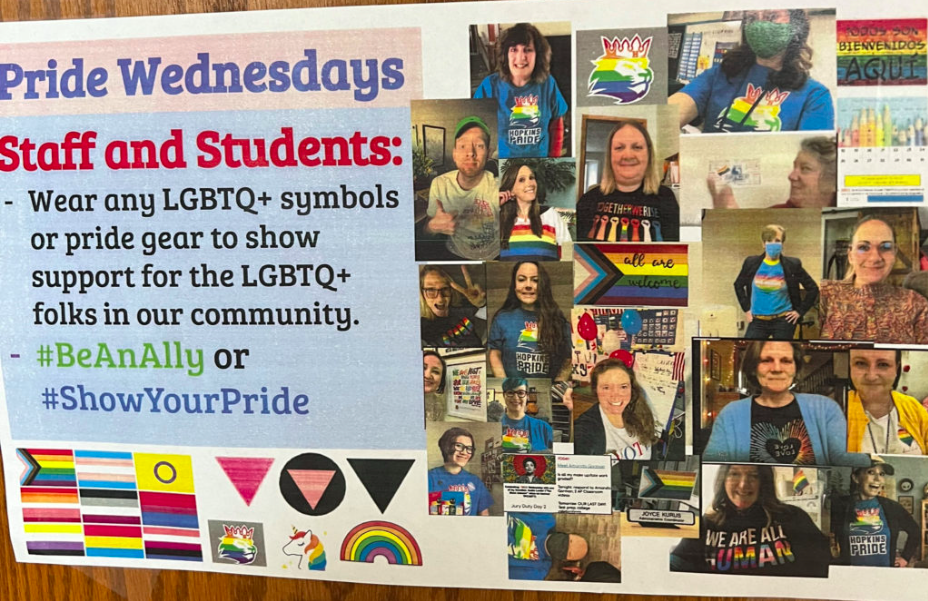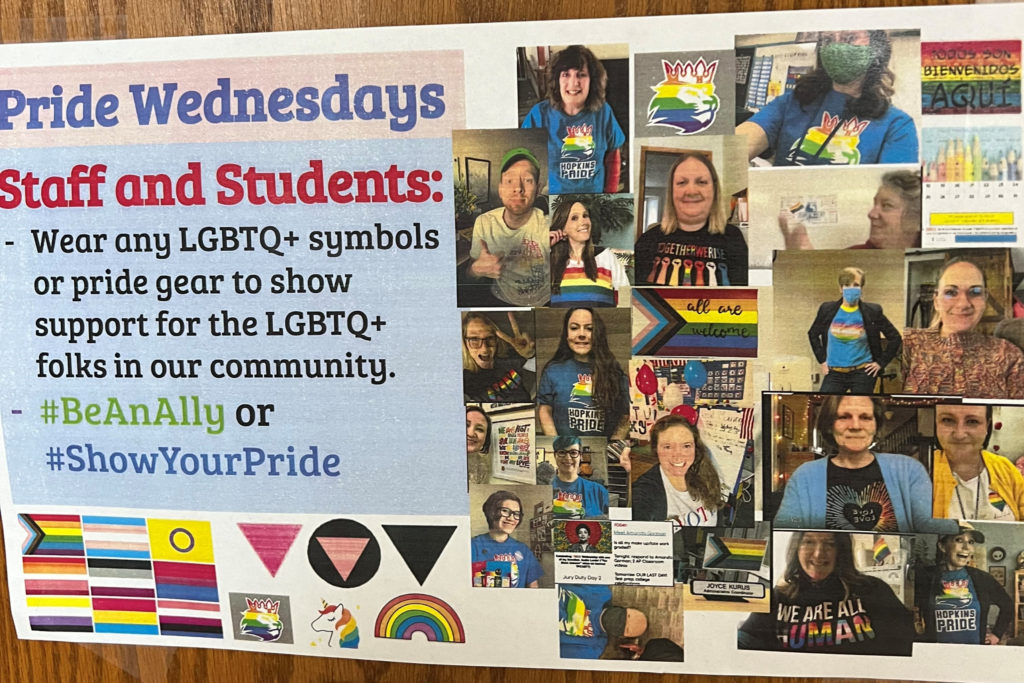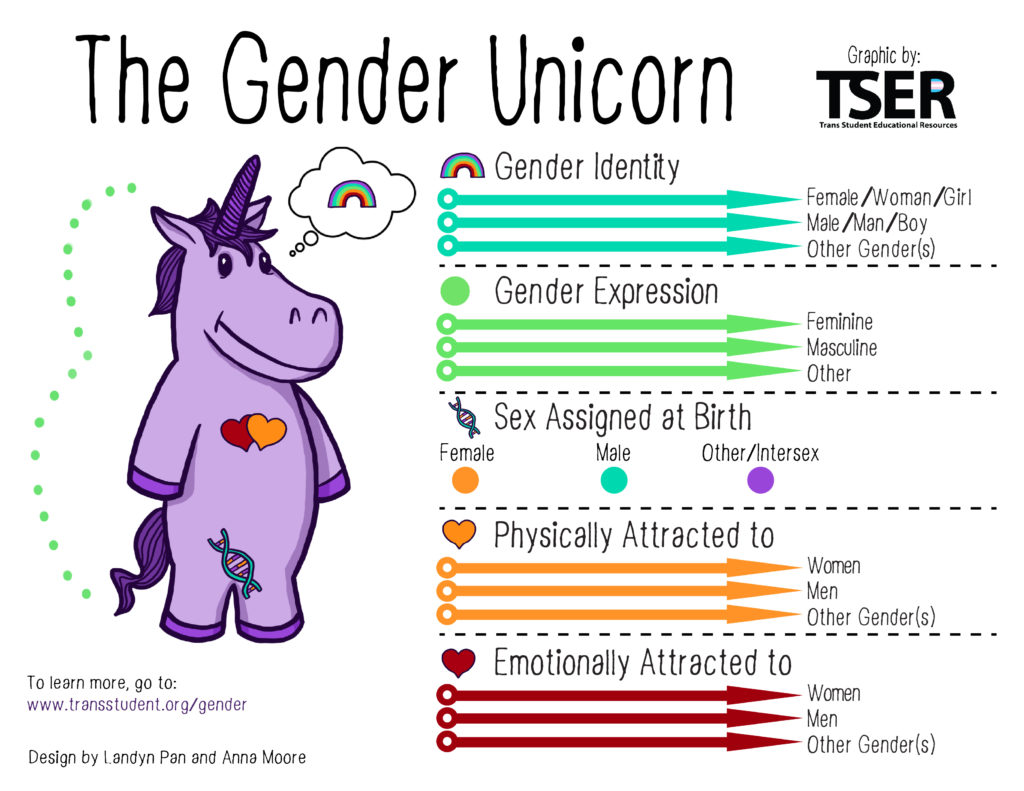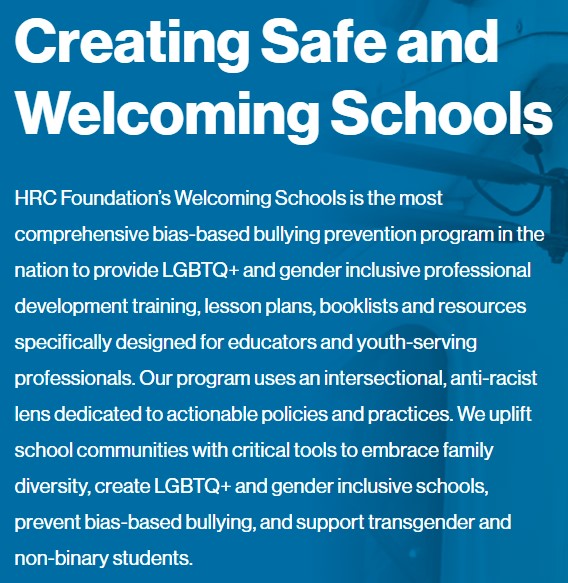
Eisenhower Elementary School celebrates “Pride Wednesdays” every week; sports participation and sleeping arrangements on overnight field trips determined by gender identity
Incidents
On May 24, 2022, Alpha News reported that Eisenhower Elementary School holds “Pride Wednesdays” every week. This is one day every week where young elementary students and teachers “dress up in rainbow colors to support the LGBTQ+ community,” according to Alpha News. The news outlet showed a photo of a poster in the elementary school promoting “Pride Wednesdays.” The poster tells “staff and students” to “wear any LGBTQ+ symbols or pride gear to show support for the LGBTQ+ folks in our community.” The poster then displays the phrases “#BeAnAlly” and “#ShowYourPride.” Several LGBTQ flags are shown, including the transgender flag.
Alpha News reported that a spokesperson of Hopkins Public Schools appeared to state that “Pride Wednesdays” occur throughout the school district and that this has been the case since January 2021. The spokesperson reportedly explained: “In Hopkins, we believe in creating affirming learning environments.”

On April 29, 2022, Alpha News reported that Eisenhower Elementary School sent an email to parents stating that sixth grade students “will be participating in a Gender, Sexuality, LGBTQ+ (Lesbian, Gay, Bisexual, Transgender, Queer, Plus) lesson” on May 2. The school explains in the email that students will learn about the “Gender Unicorn” and “gender identity.” The “Gender Unicorn” is an image that schools have used in an attempt to teach children that gender exists on a spectrum. The email to parents continues to explain:
This lesson will be led by MyHealth and is an introduction to gender and sexuality. Students learn the definition of letters in the LGBTQIA+ and how to use and respect other’s pronouns. Educators will also work through the Gender Unicorn, discussing gender expression, gender identity, sex assigned at birth, and sexual orientation. Students will brainstorm and learn how we can make our schools and shared spaces inclusive and welcoming to all.
Alpha News continued to report that a spokesperson of the school district defended the lesson by stating that “sixth-grade is a very typical time for students to receive puberty and human sexuality units.” The spokesperson also said that “this is universal across most schools.”


On April 27, 2021, Hopkins Public Schools adopted a new policy titled “Gender Inclusion.” The policy states that “Hopkins Public Schools shall act to ensure that students who are transgender and gender non-conforming are included in all school activities and have equal access to all programs offered by the District like their peers.” The policy then includes definitions for the terms “gender fluid,” “gender identity,” “gender non-conformity,” “nonbinary gender,” and “transgender.” The definition of “gender fluid” in the policy states “denoting or relating to a person who does not identify themselves as having a fixed gender.” The definition of “nonbinary gender” states that it is an “umbrella term to describe any gender identity that does not fit into the gender binary of male and female.”
The policy also states that teachers and students will receive “education and training” on the issue of “gender inclusion.” The policy explains: “Education and training regarding the issues addressed in this gender inclusion policy will be provided for employees, students and the broader school community.” The policy also states that school staff will help students transition and that parents can create a “tailored gender transition plan” to assist the process. The policy states:
Students who transition socially at school have a right to a safe and supportive environment. School administration and staff shall work with any such students and their parents/guardians to identify which steps will create the necessary conditions to make the transition experience as positive as possible. Based on this work, the school, student, and parents/guardians may choose to create a tailored gender transition plan that ensures the school environment remains both safe and supportive of the student.
The policy appears to state that school staff must also call students by their preferred pronouns and name. The policy states that “students have the right to be addressed by a preferred name and by a pronoun corresponding to their gender identity.” The school district will also expand “the options for gender selection on school forms.”
The policy further states that students “have the right to dress in accordance with their gender identity,” “have the right to participate in any such activities or conform to any such rule, policy, or practice in a manner that aligns with their gender identity,” and “have the right to participate fully in overnight trips and other activities.” The policy continues to explain that “all students have the right to participate in physical education classes, intramural sports, and interscholastic athletics in a manner that aligns with their gender identity.” This includes access to “restrooms, locker rooms, and changing areas that align with the student’s gender identity.”
On April 5, 2022, the school district’s Board of Education approved a resolution titled “Resolution Supporting Transgender, Nonbinary, and Gender Expansive Scholars.” The resolution states that the school district “values our transgender, nonbinary, and gender expansive scholars” and links to the Human Rights Campaign. In the resolution, the Board of Education states that “we acknowledge there is a coordinated, nationwide attempt to restrict the rights of transgender, nonbinary, and gender expansive youth.” The Board of Education also states in the resolution that “we are committed to creating environments in Hopkins Schools for our transgender, nonbinary, and gender expansive scholars to show up as their full selves, experience safety, and thrive.”
The resolution also states that the Board will “commit to practices within the Hopkins School District that protect and affirm our transgender, nonbinary, and gender expansive scholars, including the full implementation of our Gender Inclusion Policy, and the review of all Hopkins Schools policies to be gender expansive and inclusive.” The resolution also states the school district’s support for “Gender Sexuality Alliances (GSAs) and Queer Straight Alliances (QSAs) in our schools.”
The Board of Education additionally states in the resolution that “we support ongoing professional development for district staff on gender-affirming practices, including the creation of a staff guide as recommended by our scholars.” The Board of Education also supports changing the curricula taught to students to include transgender issues: “We support updating our curricula to be gender expansive and affirming, paying special attention to health and wellness and social studies classes as recommended by our scholars.”
The Board of Education states in the resolution that “we support hiring and retaining transgender, nonbinary, and gender expansive employees so our youth have visible role models and representation.” The school district will also remove “gender binary language” from documents to ensure that “gender inclusive language” is used. The resolution states: “We will audit our systems to remove solely gender binary language from all aspects and change forms and school documents to use gender inclusive language.” The school district will also “require new technologies, apps, and programs use gender inclusive language before buying subscriptions or making purchases.”
The Board of Education moves to outright political advocacy at the end of the resolution. The Board of Education states in the resolution:
We call on elected and appointed officials at all levels of government in the State of Minnesota to denounce and reject attempts to limit the rights of transgender, nonbinary, and gender expansive youth.” The Board then continues to state: “We call on elected and appointed officials at all levels of government in the State of Minnesota to create policies and enact practices that protect the rights of transgender, nonbinary, and gender expansive youth, and create the conditions for them to thrive.
The Human Rights Campaign is a political organization that advocates for corporations and schools to adopt LGBTQ issues in their businesses and curricula. The organization has a history of working with schools, teachers unions, and the federal government to push LGBTQ activism into the nation’s education system. The organization has a “Welcoming Schools” program with the purpose of providing “LGBTQ+ and gender inclusive professional development training, lesson plans, booklists and resources specifically designed for educators and youth-serving professionals.”

The school district is currently creating a “Racial Equity Policy” with a “working draft” already existing from May 10, 2022. This draft states that the school district “will identify and correct systemic practices and policies that perpetuate both the access and opportunity gaps driven by institutionalized and structural racism.” The draft continues to state: “In the United States, there has been a long history of legal and de facto discrimination that has led to institutional, structural, and individual racism and bias inconsistent with Hopkins Schools mission, vision, and core values.” The draft then uses the term “vigilant equity” by explaining “as a District, we engage in vigilant equity in order to eradicate predictable outcomes based on race.” The draft continues to state:
Our vigilant equity work identifies that racial inequities have been created and perpetuated over time and can be eliminated. Similarly, personal prejudice is learned and can be unlearned. Creating, ignoring, or perpetuating these and other such inequities that impact students and staff is racial misconduct. By way of this policy and implementation, the Hopkins School Board and the District are committed to understanding and interrupting explicit and implicit systemic racism and patterns of bias at all levels of the organization that result in racially predictable outcomes.
The policy draft states that the school district will “engage in district-provided anti-racist professional learning, including implicit bias, to eliminate systemic, measurable inequities in our education system.” The school district will also “center student of color voice as a critical part of school and district decision-making and culture-building.” To ensure “vigilant equity,” the school district plans to implement several actions, including mandated anti-racism training for teachers and changing the curriculum taught to students. The following are listed as actions for the school district to take:
- Provide district-approved annual and ongoing antiracist multicultural professional development to strengthen employee knowledge and skills to eliminate disparities in access and opportunity, course and program placement, and interventions.
- Create and maintain and staff guide to foster a culture of vigilant equity, holding all adults accountable to that core value.
- Develop and maintain anti-racist curriculum and courses for students and staff that are both flexible and incorporate the contributions of people of culture.
- Create welcoming school and facility environments that reflect and support the demographics of the student population and community and include partners who have demonstrated antiracist specific expertise — including government agencies, nonprofit organizations, businesses, and the community in general — in meeting our educational outcomes.
- Identify, implement and allocate equitable resources for supports needed to address racial disparities to provide all students a successful education experience.
- Facilitate and support restorative practices as well as the space and education needed to engage in productive conversations about race.
- Commit to whole student development by including racially sensitive social-emotional development for all students equitably.
- Continue to dismantle systemic racism in our education system through policy and practice.
- Identify Hopkins Public Schools policies, programs, professional development and practice that perpetuate systemic inequities along racial lines and reform them through an equity lens through an annual external equity audit.
- Be held accountable to our families and communities to realize our collective goals of accessible educational opportunities for all students and to eradicate predictable academic outcomes based on race through annual equity reports based on these accountability metrics.
The school district has a “Legislative Action Coalition” that advocates for political causes. This coalition has a document titled “2022 State Legislative Platform for Public Education.” One platform on this document is titled “Reimagine MN.” The document states in this section that “the state’s evolving demographics and changes in our world call for us to reimagine what schools look like.” Goals in this section include training teachers in “cultural competence” and creating a “culturally inclusive curriculum.” The phrases “cultural competence” and “culturally inclusive” are often used to describe a method of teaching that includes the race and ethnicity of students as part of the lessons taught in classrooms. The following are listed as goals to “Reimagine MN”:
- Cultural Competence for Teachers – continued teacher training must be funded; professional learning plans focused on equity; wellness resources important for teachers.
- Culturally Inclusive Curriculum and Standards – opportunity through Social Studies standards update; re-evaluate standard assessments, provide resources for new curriculum and scholar focused areas of interest/learning pathways.
- Recruit and Retain Staff of Color – engage higher education institutions; support alternative pathways for teacher licensure.
- Adult Behaviors (eliminate negatives; provide support) – more social workers, counselors, mental health professionals and restorative practitioners needed in schools.
- Shared Understanding of Equity – implement proactive district/inter-district strategies and metrics that disrupt racial bias in the education system.
- Statewide Funding – public education budgets must be tied to inflation; end the transfer of public money to private schools (support services, transportation, nursing staff); do not allow vouchers to private schools; equity for all students: fund what is mandated, reduce the need for local levies.”
Stay Informed

